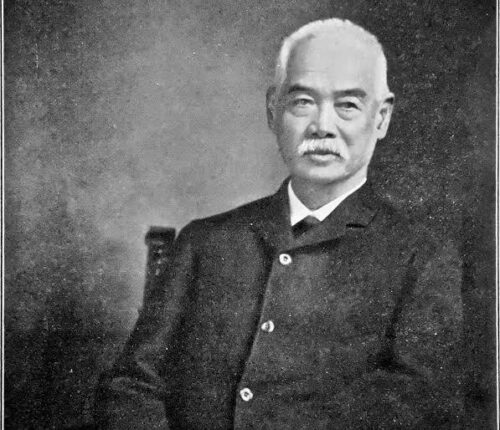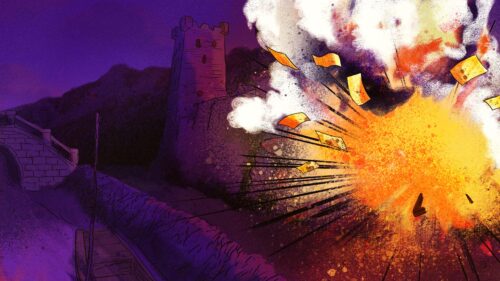This Week in China’s History: September 16, 1973
Last week on the Sinica podcast, Kaiser Kuo spoke with Jan Berris and Rosie Levine of the National Committee on U.S.-China Relations (NCUSCR) about a new report that offered new insights into the state of this vital — and increasingly tense — relationship. The report wasn’t all bad news, but there can be no doubt that U.S.-China relations are strained and, by many counts, at their lowest level in decades. For many — myself included — who began their study and experience of China in an era of steadily improving relations and consistently opening doors, it has been jarring. This Week in China’s History looks back to a time when the relationship was just beginning and optimism abounded.
On September 12, 1973, a Pan Am 707 landed in Shanghai. The plane had begun its journey two days earlier, in Philadelphia, and after stops in San Francisco, Honolulu, and Tokyo, was about to land in China with its passengers, for whom this charter had been renamed: Philadelphia Orchestra.
The story of the Philadelphia Orchestra’s 1973 visit to China has been told, powerfully and thoroughly, by journalist Jennifer Lin in her forthcoming Temple University Press book Beethoven in Beijing (which follows a documentary of the same name that Lin co-directed with Sharon Mullally, premiered last spring to great acclaim by PBS).
President Richard Nixon’s visit to China is often perceived as the “opening” of China, but it was part of a process that played out throughout the late 1960s and early 1970s. Aside from numerous backchannel discussions and semi-official meetings (like Henry Kissinger’s 1971 then-secret visit to Beijing), numerous official visits nourished relations in the early 1970s. Besides Nixon’s visit in 1972, there was the famous “ping-pong” diplomacy between the U.S. and Chinese table tennis teams and the lesser-known visit of a martial arts troupe featuring an 11-year-old Jet Li. (Aligning with the recent Sinica podcast, many of these events were facilitated by the NCUSCR.)
One of the largest of these exchanges of athletes, artists, diplomats, and leaders, the Philadelphia Orchestra trip has received new attention because of Lin and Mullally’s film. Though not as well remembered as Nixon or ping-pong diplomacy, the “music diplomacy” was a key aspect of China’s attempts to re-engage with the world as the Cultural Revolution wound down. Zhōu Ēnlái’s 周恩来 invitations to the London and Vienna Philharmonics were key pieces in the move toward warming cultural relations with the West, but, as Lin puts it in her book, “[Zhou’s] real goal was diplomatic, and his priority was improving relations with the United States. And for that, he wanted an American orchestra.”
The Philadelphia Orchestra was long known as one of the “Big Five” American orchestras (along with New York, Boston, Chicago, and Cleveland). Furthermore, “the Philadelphians” had a historic connection with China: in the 1940s, the orchestra raised money for Dr. Norman Bethune, the Canadian doctor connected with the Communist Eighth Route Army. More recently, the Philadelphia Orchestra had become politically prominent in 1973 because it had just played Nixon’s inauguration. On the heels of that performance, Zhou proposed to Kissinger that the Philadelphia Orchestra make a trip to China. On February 20, Nixon called conductor Eugene Ormandy at his home on Rittenhouse Square to extend the invitation. September — the gap between the orchestra’s summer season in upstate New York and its fall program at the Academy of Music — emerged quickly as the time for the trip.
From the Chinese side, the trip was a microcosm of the political struggles of the late Cultural Revolution. Zhou Enlai’s “music diplomacy” was encouraged by part of a more moderate faction that wanted to scale down the ideological fervor in the country. Opposing him, the Gang of Four — particularly Máo Zédōng’s 毛泽东 wife, Jiāng Qīng 江青 — wanted no part of turning down the revolutionary volume. The conflict affected which pieces the orchestra could play. Russian composers were off-limits because of the Sino-Soviet split. Mozart and Schubert were acceptable; Strauss and Debussy were not. Beethoven was viewed favorably — he had a reputation as a revolutionary — but only certain pieces (his sixth symphony, with its celebration of rural life, was particularly appropriate). And a Chinese composition, called the Yellow River Concerto, had to be played. The entire program was worked out just days before the trip.
The orchestra arrived first in Shanghai. They would return there to perform later in the trip, but on this occasion stayed only a few hours before boarding another plane. The plane ride provided just enough time to finalize the program: Nicholas Platt, the head American diplomat in China, persuaded conductor Eugene Ormandy to add Beethoven’s Sixth to the program, at the insistence of the Chinese leadership.
After midnight on September 13, the musicians and staff arrived at the Qianmen Hotel in Beijing. The next morning, the orchestra set out to explore the streets of China’s capital, tourists who were as much a novelty as the sights they were seeing (by some estimates, the orchestra and its entourage quadrupled the number of Americans in China for the duration of their trip). For anyone who traveled in China during the 1970s or ’80s, the accounts that Jennifer Lin collects are heady nostalgia: traffic jams of bicycles, blue cotton tunics and trousers, and a powerful curiosity on both sides.
The orchestra first performed on September 14, but the highlight of the trip may have come on the 16th, when the third concert was designated as “a leadership concert.” The vague description not only marked the performance as worthy of special attention, but also meant it would be televised. The orchestra was required to arrive two hours early, and found the concert hall ringed with security. Just minutes before the concert was to begin, Jiang Qing and fellow Gang of Four member Yáo Wényuán 姚文元 arrived and took their seats in the front row. (All observers made special points to emphasize that Madame Mao — American diplomats or guests always referred to her by this name — was wearing a black silk crepe dress, not the revolutionary uniform she was nearly always seen in.)
The highlight of the concert was the Sixth Symphony — “Pastoral” — that had been added at Jiang Qing’s insistence. She led the applause and greeted the orchestra after the performance, insisting on photographs and exchanging gifts with each of the players.
The following day, news of the concert was on the front page of the People’s Daily, including photographs with Jiang Qing and Ormandy. Elated, American diplomats reported back to Washington that “Madame Mao’s presence and unprecedentedly warm welcome for the Philadelphia Orchestra…represented strong reassurance that development of bilateral relations with the United States remains a priority item for the Chinese leadership.”
The tour concluded with performances in Shanghai. Ted Koppel and Steve Bell of ABC News covered the last one, yet another indication of the gradual but accelerating rapprochement between China and the USA.
The warming of relations in the early 1970s seems naive and refreshing in its optimism, especially given the challenges of 2021. It’s important to retain perspective: the Cultural Revolution was still grinding on in 1973. Just four months after celebrating the Philadelphia Orchestra’s performance, the People’s Daily attacked not just Western music in general, but Beethoven — who had been specially requested — in particular. What had generated the change of heart? American China-watchers puzzled over the rhetoric: some surmised it was the doing of Zhou Enlai making a veiled condemnation of Jiang Qing; others placed the blame on Mao Zedong, or even on Jiang Qing as she tried to shore up her political position.
But although the curve was spiky, the trend line was unmistakable. The Cultural Revolution ended in 1976, shortly after Mao’s death. U.S.-China relations were normalized in 1979, and commerce, diplomacy, cultural and intellectual exchange soared across the turn of the 21st century. Amid an undeniable downturn, there may be some solace and some lessons found in a time when the focal point of an entire relationship rested on a troupe of American musicians.
This Week in China’s History is a weekly column. Also see:






